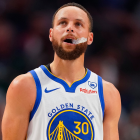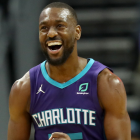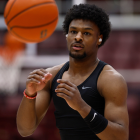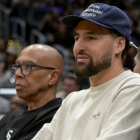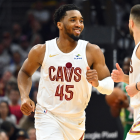MINNEAPOLIS - On Sunday afternoon, the Los Angeles Lakers lost another game. The Lakers' listless 108-86 blowout at the hands of the Minnesota Timberwolves was their fifth loss in the past six games since LeBron James' Christmas Day groin injury.
In theory, this LeBron-less stretch - which will continue for at least another three games until he's reevaluated later this week - could have been a good thing for the Lakers. Not short-term, of course. Five losses in six games, with four of those losses coming against teams with sub-.500 records, is most certainly not a good thing for the Lakers' playoff seeding. When April comes around, this stretch could even knock them out of the playoffs altogether in the crowded West; already the Lakers have slid from fourth in the West to eighth in less than two weeks. Monday they play in the second game of a road back-to-back against the Dallas Mavericks, and head coach Luke Walton could not say after Sunday's loss whether Kyle Kuzma, the Lakers second-best scoring option after LeBron, will be available. (Kuzma missed Sunday's game with a back injury, the second game in a row he's missed.)
NBA seasons are long and unpredictable affairs, but at the end of the season we could very well look back at this stretch as the stretch that killed the Lakers season. If they do make the playoffs - a LeBron team has not missed the playoffs since the 2004-05 season, LeBron's second season in the league, so making the playoffs feels like a safe bet - this could be the stretch the kills any hope of a deep playoff run. Being a four-seed means they almost certainly wouldn't face the Golden State Warriors in the first round; being a seven- or eight-seed makes that feel like close to a certainty.
But as they say, amidst tough times comes opportunities. And the Lakers' opportunity during this LeBron-less stretch - the silver lining to LeBron's injury - could have been a midseason opportunity to let this team's young core develop as players and as leaders. Part of the point of this season since the Lakers were unable to bring a second superstar to Los Angeles always has been for the Lakers to figure out which players have the most realistic potential to turn into players who can contribute to a Lakers team that can become a championship contender. The best LeBron teams have always had a second banana who is a Hall of Fame talent: Dwayne Wade during the Miami Heat run, Kyrie Irving during LeBron's second go-round with the Cleveland Cavaliers. The dream of Lakers' fans is to land a second superstar in free agency, but that may not happen. So perhaps Kuzma or Brandon Ingram or Lonzo Ball could show signs this season of developing into that perfect second banana to LeBron. That's admittedly an unlikely scenario for any of those players, but young players have ups and downs, and all of those guys have shown flashes. At the very least, this season was always going to be an opportunity to determine which of those players, plus Josh Hart, could be starters or rotation players on a championship-caliber team.
That was on my mind as the Lakers were in warmups Sunday afternoon at the Target Center. So I asked Walton just that: Of course you never want a player of LeBron's caliber to get injured. But could there be a long-term benefit - either for this year's playoffs or for future seasons - for this team's youngsters to have this opportunity to spread their wings?
"Where we're at as a team, we kind of need some continuity, which is the most important thing that we're missing right now," Walton replied. "We've been missing (continuity) a lot of the season, really. But it's a chance for players to have bigger roles, more opportunity, more responsibility and that normally grows young players quicker. Hopefully, when LeBron comes back, him and Rondo's legs will be a little fresher down the stretch of the season. But there's nothing ever positive about some of your top players being out."
"Not just Brandon (Ingram) but all our guys: We need leadership," Walton continued. "We need communication. We need guys to step up and make plays, not just for themselves but for their teammates. Brandon's one of the best we have at that, so we're constantly encouraging him to look to do that."
In the locker room pregame, Hart sat at his locker, tugging on his socks. He felt the same way: You never want LeBron to get injured, obviously. But there can be a benefit for this team's young core.
"This is our chance to be more vocal as leaders, time for us to grow and mature as players, and know how to handle certain situations and certain adversities," Hart said. "Down the stretch, especially in the playoffs, guys are going to try to key on LeBron, try to take him out of the game as best they can. So we got to have that confidence level to be able to step up in those situations."
But as one 48-minute sample size, Sunday's game showed close to zero positive developments for the Lakers - and not only because it was the Lakers fifth loss in six games since LeBron's injury.
Ball seemed the most listless of the listless Lakers on Sunday. In 23 minutes, he attempted only four shots. It was the third game of his career when he was held scoreless. (Side note: Ball also attempted zero free throws. He's only attempted 42 all season, in 39 games. How is that even possible?)
Ingram and Hart showed energy, at least, but their results weren't much better. Ingram was 5 of 16 for 13 points, while Hart was 3 of 12 for 10 points.
If LeBron's injury was an opportunity for growth for the younger Lakers, it sure doesn't seem like they've taken advantage of it. They were playing gross basketball from the opening tip. Six minutes into the game, the Lakers were down 22-3. Afterward, Walton didn't fixate on the team's miserable shooting (36.8 percent from the field) but instead on the team's lack of fire and passion.
"You can find some positives for more of the young guys, but that's not really where we're at as a team anymore," he said. "What we're trying to do and where we're at now as a group, there's not much to hang our hat on other than we need to be better. We can't play like that and (hope to) compete, whether LeBron is on the floor or not on the floor. Whether Rondo's with us or not. That type of effort won't get the job done."
This Lakers team is the complete opposite of last season's Cleveland Cavaliers team. LeBron's last Cleveland team was full of a bunch of older veterans who were picked to maximize LeBron's shot at a title, even though it was the longest of shots with the Warriors still in the way. In Los Angeles, though, LeBron joined a young and promising core of talent that seemed poised for growth (and still seems poised for growth, the past six games notwithstanding). It was the first time in his career where LeBron was the oldest player on the opening day roster. The team is filled with creators and ballhandlers. It's why Walton has turned this into one of the fastest-paced teams in the NBA, and the fastest-paced team of LeBron's career.
From the beginning, while this team certainly was not the most talented team of LeBron's career, it was always a young and exciting team filled with possibilities. Yet now they find themselves in the same position as last season's Cavaliers: Just waiting on LeBron.










